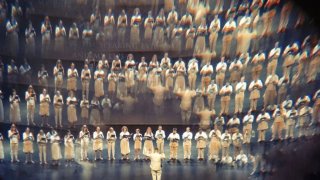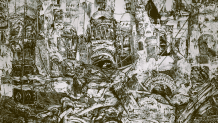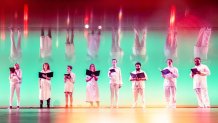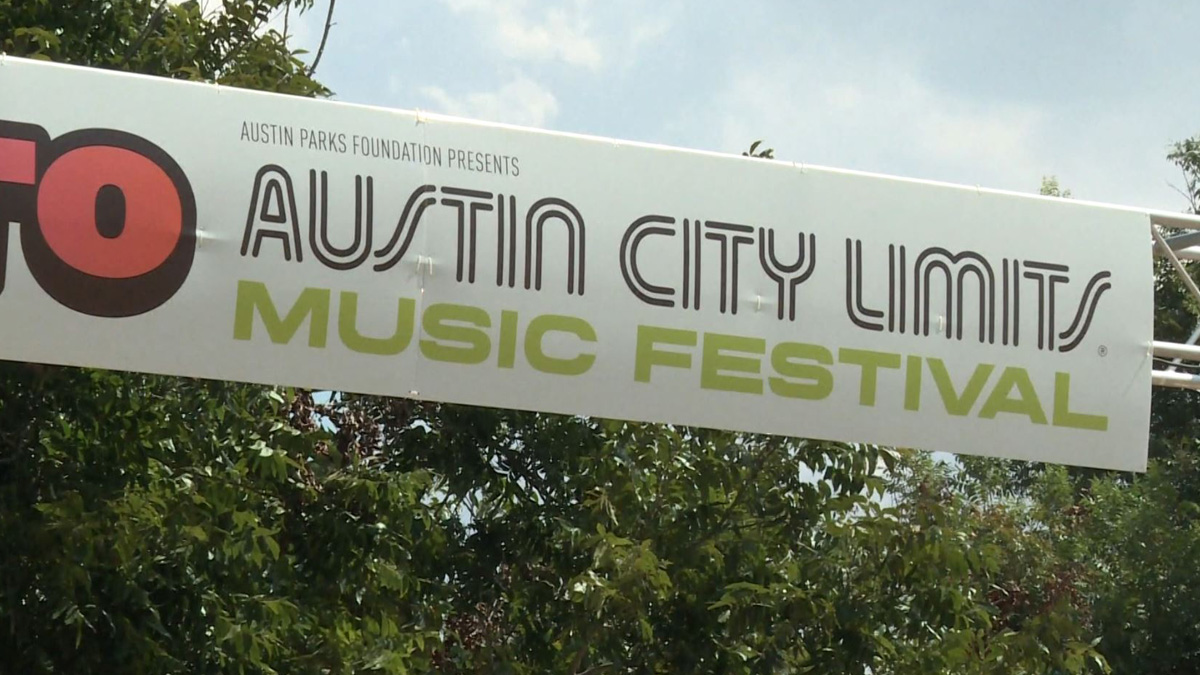
What can a modern audience learn about love from a 13th-century mystic? Verdigris Ensemble answers that question with SHAMS, a performance art experience about the transformative power of love.
After three years of collaboration with the Crow Museum of Asian Art, San Francisco-based Iranian composer Sahba Aminikia and New York-based Syrian artist Kevork Mourad, Verdigris Ensemble will premiere SHAMS April 14-16 at the Moody Performance Hall in the Dallas Arts District. The work incorporates the choral ensemble’s 16 voices, a string quartet, prerecorded sounds, visual projections and staging.
SHAMS is the most extensive collection of Rumi poetry set to music in its original Farsi. Rumi was a 13th-century Persian mystic who underwent a major transformation because of his relationship with his spiritual instructor, Shams Tabrizi.
Get DFW local news, weather forecasts and entertainment stories to your inbox. Sign up for NBC DFW newsletters.
“Rumi changes from this rigid character to a person of love and poetry,” Aminikia explained.
Rumi’s influence transcends nationality, religion and cultural divides, with his poetry translated into many languages. His work is some of the most popular poetry in the United States.
“I think he’s always been relevant, and he will always be relevant in history,” Aminikia said. “What Rumi promotes is all about love and seeing through the lens of love.”
The Scene
For an American audience, Rumi’s poetry set to music offers a different perspective of the Middle East.
“Somehow, we’re trying to say to the Western audience, ‘Don’t look at the news and build your ideas on the war and the catastrophe about the Middle East.’ There’s so much beauty and love there and let’s figure out how to bring harmony between these two worlds because it is so divided. I feel like this work could bring people together and unite people together and create new ways of sharing love and passion,” Mourad said.
At the heart of SHAMS is the powerful love between Rumi and Shams.
“If love does not end in transformation, it is not true love. True love transforms people to the point, to the extent that they start renouncing their pasts and all the values that they were followers of. That’s how the real transforming occurred in Rumi meeting Shams,” Aminikia said.
The work consists of 8 movements, melding Middle Eastern classical technique with Western choral composition. Seven of the movements reflect the seven steps of falling in love, including feeling like a child and the fear of losing someone.

Mourad’s animated art will be projected during the performance, accompanying Aminikia’s original composition. Mourad crafted the visuals to reflect how people reinvent themselves to stay fresh in love, creating a multi-layered exploration of passion.
Mourad previously worked with Aminikia on two shorter pieces.
“I feel like my relationship with Sahba is very similar to Shams and Rumi, even though we don’t have that passionate love. We have this unusual sense of understanding and respect and that makes it very much like a mirror. In this piece, I’m using this concept of mirror,” Mourad said. “Mirror has this divine way of opening, almost like a book opening. Left and right are the same. Shams and Rumi are feeding each other this energy for it to become this bigger energy of what is love in general.”
Zara Houshmand, an Iranian American author, translated the original text Divani Shams for this project. The poetry is sung in Farsi, retaining its distinctive dance-like qualities, and spoken in English.
“I feel the cadence in its original language,” said Sam Brukhman, Verdigris Ensemble’s artistic director. “And you’ll feel the meaning through the translation.”
This piece demands a new degree of personal introspection.
“Rumi’s words are very visceral. You can feel what he feels when you look at the text. It has been therapeutic for me in my life, having gone through the pandemic and having the pandemic really hurt in many different ways,” Brukhman said. “This is another level of commitment I’ve never seen in the ensemble.”

Because Dallas is the second largest Middle Eastern/North African refugee population in the United States, Brukhman, Mourad and Aminikia anticipate SHAMS will resonate with the multi-cultural community.
“We have this amazing and rich culture as part of the city of Dallas and we have a responsibility to be able to celebrate that culture and to bring awareness to it as well,” Brukhman said.
“We’re all somehow displaced people and we’re bringing our ancestor’s story using Rumi and Shams’ voice and that is so relevant because the Dallas community is from different places, they will hear and see themselves in this piece,” Mourad said.
“His poetry has survived for 700 years and there’s a reason behind that. And that reason can be a beautiful connecting point for all of us, no matter where we came from,” Aminikia said.
Learn more: Verdigris Ensemble



